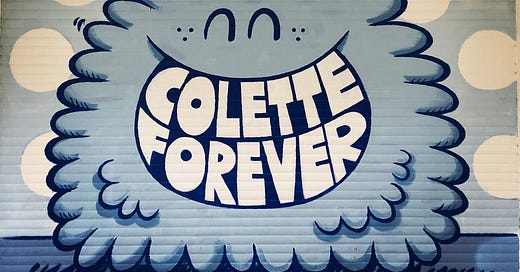#056 ✰ Time to reflect on our gifts
Towards more meaning and an even-more-joyful time next year!
Hey there 👋 I’m Mathilde. We are Objet. We explore the intersection of consumerism, myth, satisfaction, desire, taste, joy, meaning and pride. Not specifically in that order. To brag at your next dinner, Objet is the french word for 'object' and should be pronounced 'OB-JEH'.
If you’re new here, welcome !
Here’s what we’re gonna talk about today:
Christmas spree’s over
Boxing Day’s origins
Cool reads & cie, cause it’s always cool to read cool stuff
Objet
Ever felt like regretting a purchase on a regular basis? Yeah I know.
Regretful purchases have a compounding effect on our confidence, and we are building Objet to cure this pain. Empowering individuals to cure society.
Christmas Spree?
While you’re probably sprawled on your couch with a liver in recovery mode (I am personally pigging out with Shoko Bons as I type, oops), and before running into next week’s resolutions, how about taking a few minutes to reflect on these cool and less cool gifts you’ve just been offered?
We’ve crafted a collection just for this purpose - open the app, and click on the Community page: 🌎
I look forward to discovering what Santa’s been up to all over the place! ☺️
Yesterday was Boxing Day
Before it became a day of binge buying, much like Black Friday, Boxing Day was known, in the British tradition, as the day following Christmas,
where the servants of the wealthy were allowed the next day to visit their families since they would have had to serve their masters on Christmas Day. The employers would give each servant a box to take home containing gifts, bonuses, and sometimes leftover food.
Diaries from the 17th century tell stories about Boxing Day. In the United Kingdom, Canada, Australia, New Zealand and South Africa, Boxing Day is a public holiday.
Cool reads
📰 An interesting link between shopping & equality:
When A.T. Stewart opened his multistory dry goods store in 1846, the Manhattan merchant introduced two revolutionary practices that we now take for granted. He let anyone come and browse freely, whether or not intending to buy, and he charged every customer the same price. Both policies changed the everyday meaning of social equality.
(…) By the 1920s, American shoppers were affirming a new kind of equality—the democratization of luxury. Rich and poor couldn’t afford the same products, but they could enjoy versions of the same pleasures. (…) The salesgirl or office worker, wrote Samuel Strauss, a critic of the new consumerism, “does not want to look like the millionaire’s wife. She wants to have the pleasure the millionaire’s wife has, the pleasure of living luxuriously.” Installment credit, which became widespread in the 1920s, let customers pay for purchases over time, further expanding access to what were once luxuries.
📺 We just watched this documentary about the now-closed-yet-worldwide-famous Parisian store Colette - can't recommend it enough. A story of Curation x Work x Family at its best, crafting in just 20 years a unique space where “two dollar chewing-gum packs would sit next to a thousand dollar watch”, where unexpected collabs and events would gather cultures and subcultures that had never met before. 🔵 🔵 You can get the movie here for a few bucks. Here’s the trailer:
Happy end of 2022, take care, enjoy a break, and see you next year amigos!
Mathilde




